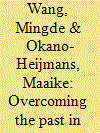|
|
|
Sort Order |
|
|
|
Items / Page
|
|
|
|
|
|
|
| Srl | Item |
| 1 |
ID:
113720


|
|
|
|
|
| Publication |
2012.
|
| Summary/Abstract |
The Japanese government and business sector have long seen opportunities in making environmental protection a core feature of industrial policy. The 'green' economic diplomacy-effort, which materialized in the late 1980s and largely builds on targeted domestic innovation policies, is now entering new ground. Assessing recent developments in the railway, nuclear power generation, water, and next-generation automobile industries, this paper analyses how and why the Japanese government uses 'green' environmental and energy technology in relations with emerging and developed countries. Public-private partnerships are strengthened, and semi-governmental institutions and individual politicians take up new roles. Adhering to comprehensive security traditions, Japan's policies aim to contribute to the national interest both in terms of economic prosperity and political stability. Primary objectives are the quest for new markets abroad, resources security, and securing cooperative relations with other countries. Adjustment to shifting global power balances, domestic politics, and climate change challenges also play a role, while 'hard' security issues are barely considered.
|
|
|
|
|
|
|
|
|
|
|
|
|
|
|
|
| 2 |
ID:
112625


|
|
|
|
|
| Publication |
2012.
|
| Summary/Abstract |
Japan's economic diplomacy has evolved significantly since the 1990s in response to the reconfiguration of regional and global power. This article places developments along a conceptual continuum and finds that, slowly but steadily, Japanese policies shift from an emphasis on commercial goals of economic diplomacy to include also a more outspoken element of power play. While tourism promotion may be considered a new part of economic diplomacy, long-time practices of trade and investment promotion, business advocacy, and development cooperation are revamped with a focus on the environmental and energy fields. The negotiation of trade agreements, which for long was highjacked by domestic politics, was given new impetus in 2010, while financial diplomacy-which seemed promising in the early 2000s-stalled. Finally, negative sanctioning is no longer a taboo, particularly in the relationship with North Korea. The appetite of the government and private sector to conform with Western countries remains limited, however, and the ambiguity between the old and the new suggests that we are witnessing a change in Japanese tactics rather than in strategy.
|
|
|
|
|
|
|
|
|
|
|
|
|
|
|
|
| 3 |
ID:
104308


|
|
|
|
|
| Publication |
2011.
|
| Summary/Abstract |
Historical disputes and nationalism continue to be issues of concern and controversy in the relationship between Japan and China. In 2005, popular nationalist sentiment culminated in nationwide anti-Japanese movements in China. This led to a crucial shift in the way China and Japan deal with history and popular nationalism. An unprecedented dialogue on war memory was initiated in late 2006, and the Sichuan earthquake relief effort in mid-2008 marked a further departure from earlier patterns. The Chinese government shifted away from conventional historiography that largely fed negative images of Japan. While these developments point to new, cooperative attitudes that aim to contain popular nationalist sentiment in manageable proportions, relations are nevertheless increasingly obscured by other tensions in the bilateral relationship.
|
|
|
|
|
|
|
|
|
|
|
|
|
|
|
|
|
|
|
|
|